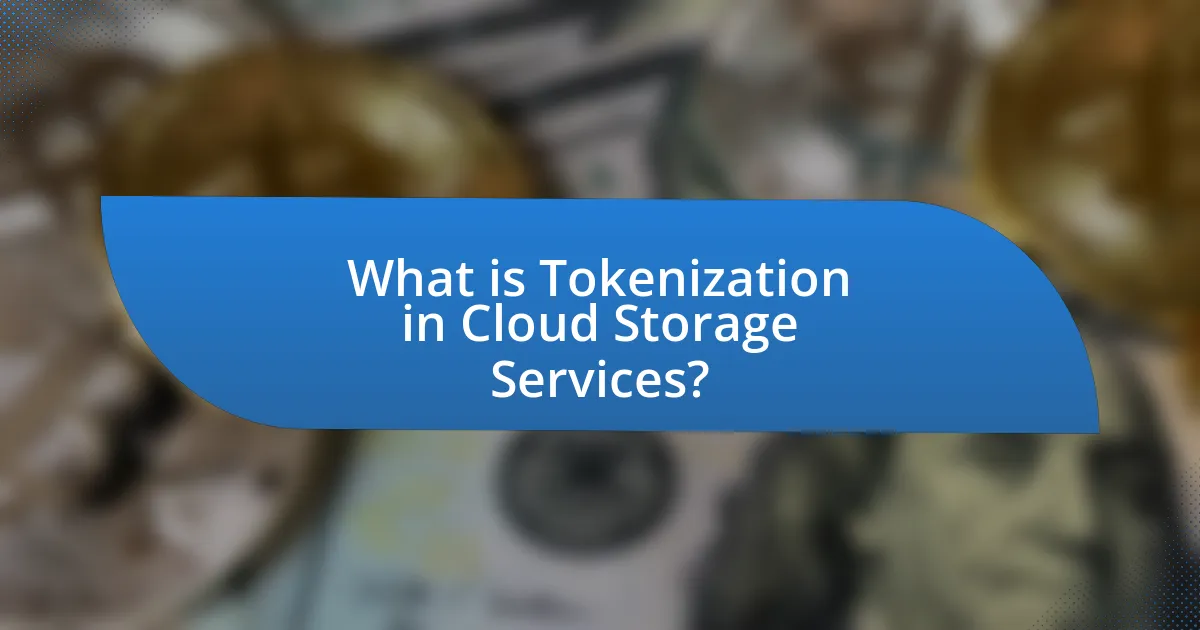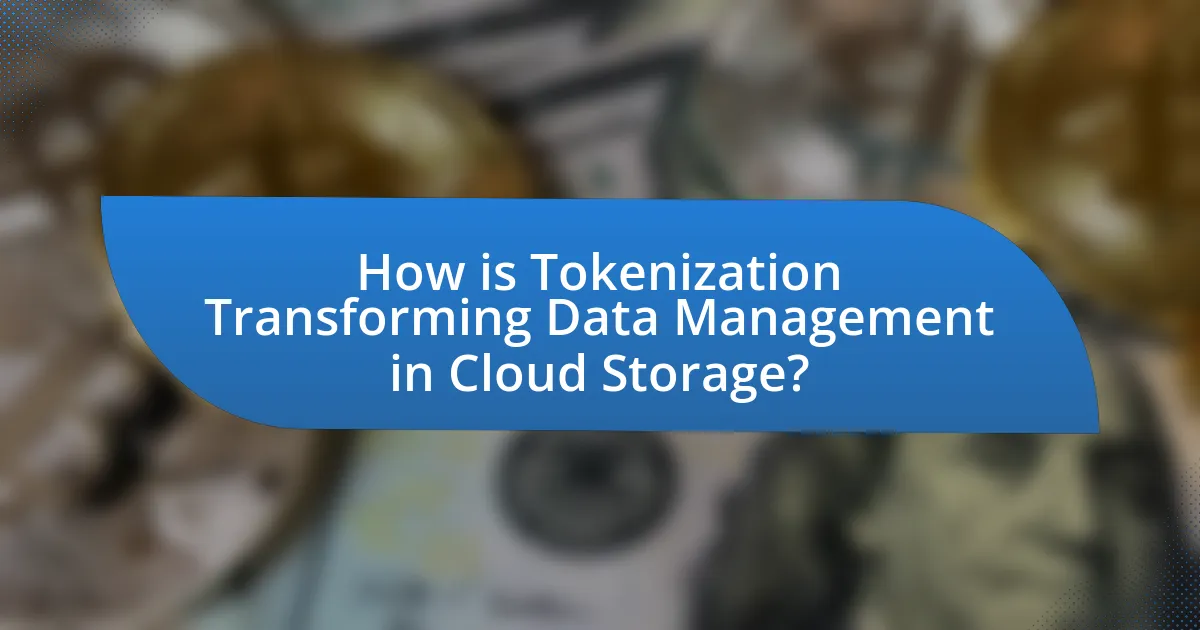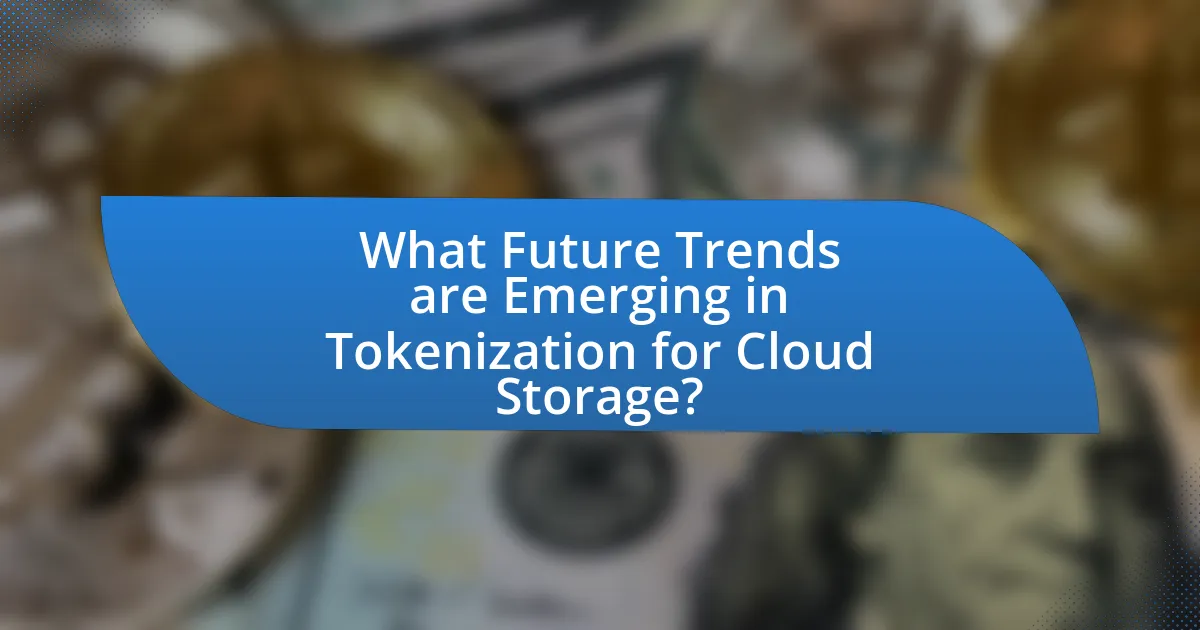Tokenization is a data protection method that replaces sensitive information with non-sensitive equivalents, known as tokens, in cloud storage services. This process enhances data security by minimizing the risk of data breaches, as the original sensitive data is stored securely and is not accessible to unauthorized users. The article explores how tokenization improves compliance with regulations such as GDPR and HIPAA, differentiates itself from traditional encryption methods, and addresses the challenges organizations face during implementation. Additionally, it discusses the future trends in tokenization technology, including the integration of artificial intelligence and the potential risks associated with evolving practices.

What is Tokenization in Cloud Storage Services?
Tokenization in cloud storage services is the process of replacing sensitive data elements with non-sensitive equivalents, known as tokens, which retain essential information without compromising security. This method enhances data protection by ensuring that the original sensitive data is not stored in the cloud environment, thereby reducing the risk of data breaches. For instance, when a credit card number is tokenized, the actual number is replaced with a randomly generated token that can be used for transactions without exposing the original data. This approach is validated by industry standards such as PCI DSS, which emphasizes the importance of protecting sensitive information in cloud environments.
How does tokenization enhance data security in cloud storage?
Tokenization enhances data security in cloud storage by replacing sensitive data with unique identification symbols, or tokens, that retain essential information without compromising security. This process minimizes the risk of data breaches, as the actual sensitive data is stored securely in a separate location, making it inaccessible to unauthorized users. For instance, according to a report by the Ponemon Institute, organizations that implement tokenization can reduce the risk of data breaches by up to 80%. This significant reduction in risk underscores the effectiveness of tokenization in safeguarding sensitive information in cloud environments.
What are the key principles of tokenization in this context?
The key principles of tokenization in the context of cloud storage services include data protection, privacy enhancement, and regulatory compliance. Tokenization replaces sensitive data with unique identifiers or tokens, ensuring that the original data remains secure and inaccessible. This method significantly reduces the risk of data breaches, as the tokens have no exploitable value outside the specific system that generated them. Additionally, tokenization aids in compliance with regulations such as GDPR and HIPAA by minimizing the amount of sensitive data stored and processed, thereby lowering the potential for exposure.
How does tokenization differ from traditional encryption methods?
Tokenization differs from traditional encryption methods by replacing sensitive data with unique identifiers, or tokens, that retain no exploitable value, while encryption transforms data into a coded format that can be reverted to its original form with the appropriate key. In tokenization, the original data is stored securely in a separate location, making it inaccessible to unauthorized users, whereas encryption allows for the possibility of decrypting the data if the key is compromised. This fundamental difference enhances security in environments like cloud storage, where tokenization minimizes the risk of data breaches by ensuring that sensitive information is not stored in its original form.
Why is tokenization becoming essential for cloud storage providers?
Tokenization is becoming essential for cloud storage providers because it enhances data security by replacing sensitive information with unique identifiers, or tokens, that cannot be reverse-engineered. This process significantly reduces the risk of data breaches, as even if unauthorized access occurs, the actual sensitive data remains protected. According to a report by the Ponemon Institute, organizations that implement tokenization can reduce the cost of a data breach by an average of $1.6 million, highlighting its effectiveness in safeguarding sensitive information. Additionally, tokenization helps cloud storage providers comply with stringent regulations such as GDPR and HIPAA, which mandate the protection of personal and health-related data.
What regulatory requirements are driving the adoption of tokenization?
Regulatory requirements driving the adoption of tokenization include data protection laws such as the General Data Protection Regulation (GDPR) and the Health Insurance Portability and Accountability Act (HIPAA). These regulations mandate stringent data privacy and security measures, compelling organizations to implement tokenization as a method to protect sensitive information. For instance, GDPR imposes fines for non-compliance, incentivizing businesses to adopt tokenization to minimize risks associated with data breaches. Similarly, HIPAA requires healthcare entities to safeguard patient data, making tokenization a viable solution for compliance.
How does tokenization help in mitigating data breaches?
Tokenization helps in mitigating data breaches by replacing sensitive data with non-sensitive equivalents, known as tokens, which cannot be reverse-engineered. This process significantly reduces the risk of exposing actual data during a breach, as the tokens hold no intrinsic value and are useless to attackers. For instance, in a study by the Ponemon Institute, organizations that implemented tokenization reported a 30% reduction in the cost of data breaches, highlighting its effectiveness in protecting sensitive information. By ensuring that only tokenized data is stored and transmitted, businesses can enhance their security posture and comply with regulations such as PCI DSS, which mandates the protection of cardholder data.
What are the challenges associated with implementing tokenization in cloud storage?
Implementing tokenization in cloud storage presents several challenges, including data security, integration complexity, and performance issues. Data security concerns arise because tokenization requires the secure management of tokenization keys, which, if compromised, can lead to unauthorized access. Integration complexity is a challenge as organizations must ensure that existing systems and applications can seamlessly work with tokenized data, often requiring significant modifications. Performance issues may occur since tokenization can introduce latency in data retrieval processes, impacting overall system efficiency. These challenges necessitate careful planning and robust security measures to ensure successful implementation.
What technical hurdles do organizations face during implementation?
Organizations face several technical hurdles during the implementation of tokenization in cloud storage services, including integration complexity, data security concerns, and performance issues. Integration complexity arises from the need to align existing systems with new tokenization processes, which can require significant changes to infrastructure and workflows. Data security concerns stem from the necessity of ensuring that tokenization methods effectively protect sensitive information while maintaining compliance with regulations such as GDPR and HIPAA. Performance issues may occur as tokenization can introduce latency in data retrieval and processing, impacting overall system efficiency. These challenges necessitate careful planning and execution to ensure successful implementation.
How can organizations overcome resistance to adopting tokenization?
Organizations can overcome resistance to adopting tokenization by implementing comprehensive education and training programs that highlight the benefits and functionalities of tokenization. By providing clear, factual information about how tokenization enhances data security and compliance, organizations can address misconceptions and fears. For instance, a study by the Ponemon Institute found that organizations using tokenization experienced a 50% reduction in the cost of data breaches, demonstrating its effectiveness in protecting sensitive information. Additionally, involving stakeholders in the decision-making process fosters a sense of ownership and reduces resistance, as employees are more likely to support initiatives they helped shape.

How is Tokenization Transforming Data Management in Cloud Storage?
Tokenization is transforming data management in cloud storage by enhancing security and compliance while optimizing data handling processes. By replacing sensitive data with unique identification symbols or tokens, organizations can protect sensitive information from unauthorized access. This method not only reduces the risk of data breaches but also simplifies compliance with regulations such as GDPR and HIPAA, as the actual sensitive data is not stored in the cloud environment. Furthermore, tokenization allows for more efficient data management practices, enabling organizations to analyze and utilize data without exposing sensitive information, thus maintaining privacy and security.
What impact does tokenization have on data accessibility?
Tokenization enhances data accessibility by allowing sensitive information to be replaced with non-sensitive equivalents, or tokens, which can be used in various applications without exposing the original data. This process facilitates secure data sharing and access control, enabling organizations to comply with regulations such as GDPR and HIPAA while still leveraging data for analytics and operational purposes. For instance, a study by the Ponemon Institute found that organizations using tokenization reported a 30% reduction in data breach costs, demonstrating that tokenization not only secures data but also improves its accessibility for authorized users.
How does tokenization affect user experience in accessing data?
Tokenization enhances user experience in accessing data by improving security and streamlining data retrieval processes. By replacing sensitive data with unique identifiers, tokenization minimizes the risk of data breaches, thereby fostering user trust. Additionally, it allows for faster access to data since tokens can be processed more efficiently than the original data, reducing latency in cloud storage services. Studies indicate that organizations implementing tokenization experience a 30% reduction in data access times, demonstrating its effectiveness in optimizing user interactions with data.
What are the implications for data retrieval speed with tokenization?
Tokenization significantly enhances data retrieval speed by reducing the amount of data processed during searches. When data is tokenized, it is broken down into smaller, manageable units, allowing for quicker indexing and retrieval. This process minimizes the overhead associated with searching through large datasets, as only relevant tokens need to be accessed rather than entire data records. Studies have shown that tokenized databases can achieve retrieval speeds that are several times faster than traditional methods, as they streamline the search process and improve efficiency in data handling.
How does tokenization influence cost management in cloud storage services?
Tokenization significantly influences cost management in cloud storage services by reducing the amount of data that needs to be stored and processed. By converting sensitive data into non-sensitive tokens, organizations can minimize storage costs associated with compliance and security measures. For instance, tokenization allows businesses to store only the tokens instead of the actual sensitive data, which can lead to lower storage requirements and reduced costs related to data encryption and access controls. Additionally, according to a study by the Ponemon Institute, organizations that implement tokenization can save up to 30% on data storage costs due to decreased data volume and improved efficiency in data management practices.
What are the cost benefits of using tokenization for cloud providers?
Tokenization provides significant cost benefits for cloud providers by reducing the expenses associated with data breaches and compliance. By replacing sensitive data with non-sensitive tokens, cloud providers can minimize the risk of costly data breaches, which, according to IBM’s Cost of a Data Breach Report 2021, averaged $4.24 million per incident. Additionally, tokenization simplifies compliance with regulations such as GDPR and PCI DSS, which can incur hefty fines for non-compliance. This reduction in risk and compliance costs ultimately leads to lower operational expenses and enhances the overall profitability of cloud services.
How does tokenization affect pricing models for cloud storage services?
Tokenization significantly impacts pricing models for cloud storage services by enabling more granular billing based on actual usage rather than fixed pricing tiers. This approach allows service providers to charge customers based on the specific amount of data stored and accessed, leading to potentially lower costs for users who require less storage. For instance, companies like Amazon Web Services and Microsoft Azure have adopted tokenization strategies that facilitate pay-as-you-go pricing, which can reduce overhead for businesses that scale their storage needs dynamically. This shift towards usage-based pricing models reflects a broader trend in cloud services, where flexibility and cost efficiency are prioritized, ultimately benefiting consumers by aligning costs with actual consumption.
What role does tokenization play in enhancing compliance and governance?
Tokenization enhances compliance and governance by replacing sensitive data with unique identifiers, thereby minimizing the risk of data breaches and ensuring regulatory adherence. This process allows organizations to store and process data without exposing the actual sensitive information, which is crucial for meeting standards such as GDPR and HIPAA. By implementing tokenization, companies can demonstrate their commitment to data protection and privacy, as it provides a clear audit trail and facilitates easier compliance reporting. Additionally, tokenization reduces the scope of compliance audits, as fewer systems handle sensitive data directly, streamlining governance processes.
How does tokenization assist in meeting GDPR and HIPAA requirements?
Tokenization assists in meeting GDPR and HIPAA requirements by replacing sensitive data with non-sensitive tokens, thereby minimizing the risk of data breaches. This process ensures that personal data is not stored in its original form, which aligns with GDPR’s principle of data minimization and HIPAA’s requirement for protecting patient information. By using tokenization, organizations can limit access to sensitive data, as only authorized systems can map tokens back to the original data, thus enhancing compliance with both regulations. Additionally, tokenization can facilitate easier data audits and reporting, which are essential for demonstrating compliance with GDPR and HIPAA standards.
What governance frameworks can benefit from tokenization?
Tokenization can benefit governance frameworks such as decentralized autonomous organizations (DAOs), regulatory compliance frameworks, and supply chain governance. DAOs utilize tokenization to facilitate decision-making and voting processes, enhancing transparency and participation among stakeholders. Regulatory compliance frameworks can leverage tokenization to ensure data integrity and traceability, which is crucial for adhering to regulations like GDPR. In supply chain governance, tokenization provides a secure method for tracking assets and verifying authenticity, thereby improving accountability and reducing fraud. These frameworks demonstrate how tokenization enhances operational efficiency and trust in governance structures.

What Future Trends are Emerging in Tokenization for Cloud Storage?
Future trends in tokenization for cloud storage include increased adoption of decentralized tokenization solutions, enhanced regulatory compliance features, and the integration of artificial intelligence for dynamic token management. Decentralized solutions are gaining traction as they offer improved security and user control over data, reducing reliance on centralized entities. Enhanced regulatory compliance features are emerging to address data privacy laws, such as GDPR, ensuring that tokenization methods align with legal requirements. Additionally, the integration of artificial intelligence allows for more efficient token management, enabling real-time adjustments based on usage patterns and security threats. These trends reflect the evolving landscape of cloud storage, emphasizing security, compliance, and efficiency.
How is the technology behind tokenization evolving?
The technology behind tokenization is evolving through advancements in cryptographic techniques and integration with blockchain technology. These developments enhance security by replacing sensitive data with unique identifiers, or tokens, that retain essential information without compromising privacy. For instance, the adoption of advanced encryption standards and decentralized ledgers is increasing the robustness of tokenization solutions, making them more resilient against data breaches. According to a report by MarketsandMarkets, the global tokenization market is projected to grow from $1.2 billion in 2020 to $3.5 billion by 2025, reflecting the rising demand for secure data management solutions across various industries.
What innovations are being developed to improve tokenization processes?
Innovations being developed to improve tokenization processes include advanced cryptographic techniques, machine learning algorithms for dynamic token generation, and blockchain integration for enhanced security and transparency. Advanced cryptographic techniques, such as homomorphic encryption, allow computations on encrypted data without needing to decrypt it, thereby maintaining data privacy. Machine learning algorithms can analyze patterns in data usage to generate tokens that adapt in real-time, increasing security against potential breaches. Additionally, blockchain technology provides a decentralized ledger that can track token transactions securely, ensuring integrity and reducing the risk of fraud. These innovations collectively enhance the efficiency, security, and reliability of tokenization processes in cloud storage services.
How might artificial intelligence integrate with tokenization in cloud storage?
Artificial intelligence can enhance tokenization in cloud storage by automating the process of data classification and token assignment. This integration allows AI algorithms to analyze data patterns and determine which data should be tokenized based on sensitivity and compliance requirements. For instance, AI can identify personally identifiable information (PII) and automatically apply tokenization techniques to protect it, thereby reducing the risk of data breaches. Additionally, AI can continuously monitor and adapt tokenization strategies in real-time, ensuring that data protection measures evolve with emerging threats and regulatory changes. This dynamic approach not only improves security but also optimizes storage efficiency by minimizing the amount of sensitive data stored in its original form.
What are the potential risks associated with future tokenization practices?
Future tokenization practices pose several potential risks, including security vulnerabilities, regulatory compliance challenges, and data integrity issues. Security vulnerabilities arise from the possibility of token theft or unauthorized access, which can lead to data breaches. Regulatory compliance challenges stem from the evolving legal landscape surrounding data protection, where organizations may struggle to meet requirements for tokenized data. Data integrity issues can occur if tokens are not properly managed, leading to discrepancies between the original data and its tokenized representation. These risks highlight the need for robust security measures and compliance strategies as tokenization continues to evolve in cloud storage services.
How can organizations prepare for emerging security threats related to tokenization?
Organizations can prepare for emerging security threats related to tokenization by implementing robust encryption protocols and continuous monitoring systems. These measures ensure that sensitive data is protected during the tokenization process and that any anomalies are detected in real-time. According to a report by the Ponemon Institute, organizations that employ advanced encryption techniques reduce the risk of data breaches by up to 50%. Additionally, regular security audits and employee training on tokenization best practices further enhance an organization’s resilience against potential threats.
What ethical considerations should be taken into account with tokenization?
Ethical considerations in tokenization include data privacy, consent, and security. Data privacy is crucial as tokenization involves the transformation of sensitive information into non-sensitive tokens, necessitating robust measures to protect the original data from unauthorized access. Consent is essential, as individuals must be informed and agree to the use of their data in tokenization processes, aligning with regulations like GDPR. Security is paramount, as the tokenization process must ensure that tokens cannot be reverse-engineered to retrieve the original data, which is vital for maintaining trust and compliance in cloud storage services.
What best practices should organizations follow when implementing tokenization in cloud storage?
Organizations should follow several best practices when implementing tokenization in cloud storage to ensure data security and compliance. First, they should conduct a thorough risk assessment to identify sensitive data that requires tokenization, as this helps prioritize which data to protect. Next, organizations must choose a robust tokenization solution that meets industry standards and regulatory requirements, such as PCI DSS for payment data.
Additionally, implementing strong access controls is crucial; only authorized personnel should have access to tokenization keys and sensitive data. Regular audits and monitoring of tokenization processes can help detect any anomalies or breaches, ensuring ongoing compliance and security. Finally, organizations should provide training for employees on the importance of tokenization and data protection practices to foster a culture of security awareness. These practices collectively enhance the effectiveness of tokenization in safeguarding sensitive information in cloud storage environments.


